Cannabis Trim - What To Do With Cannabis Trim And Fan Leaves?
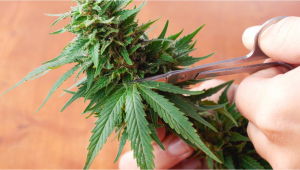
- 1. What is trim?
- 2. Disposing of the trimmings responsibly
- 3. Choosing what to make
- 4. Making the most out of trim
- 5. Water hash
- 5. a. Materials
- 5. b. How to make
- 6. Dry sift hash
- 6. a. Materials
- 6. b. How to make
- 7. Decarboxylation
- 8. Cannabutter
- 8. a. Materials
- 8. b. How to make
- 9. Infused olive oil
- 9. a. Materials
- 9. b. How to make
- 10. Other ways to use trimmings
- 11. In conclusion
When talking about growing cannabis seeds, trimming consists of removing the excess foliage on buds to make them appealing and ready for consumption. When trimming buds you usually have a lot of plant material left and depending on the amount of trichomes, you can use it to make different cannabis products. Those trichomes can be used to make extractions such as dry sift has, water hash, edibles, and even rosin, depending on the quantity and quality, so make sure you know how to trim weed before starting.
1. What Is Trim?
Marijuana trimmings and cannabis fan leaves are the plant leftovers after manicuring our buds. When our plant is ready to be harvested there is an excess of plant material, this excess must be removed before curing and (eventually) smoking our flowers. When trimming, we not only remove the small leaves coming out of the buds but also the big fan leaves, typical of cannabis plants. So when talking about cannabis trim we refer to all the plant material, including the fan leaves, small leaves, popcorn buds, and any other part of the plant that we may have removed.
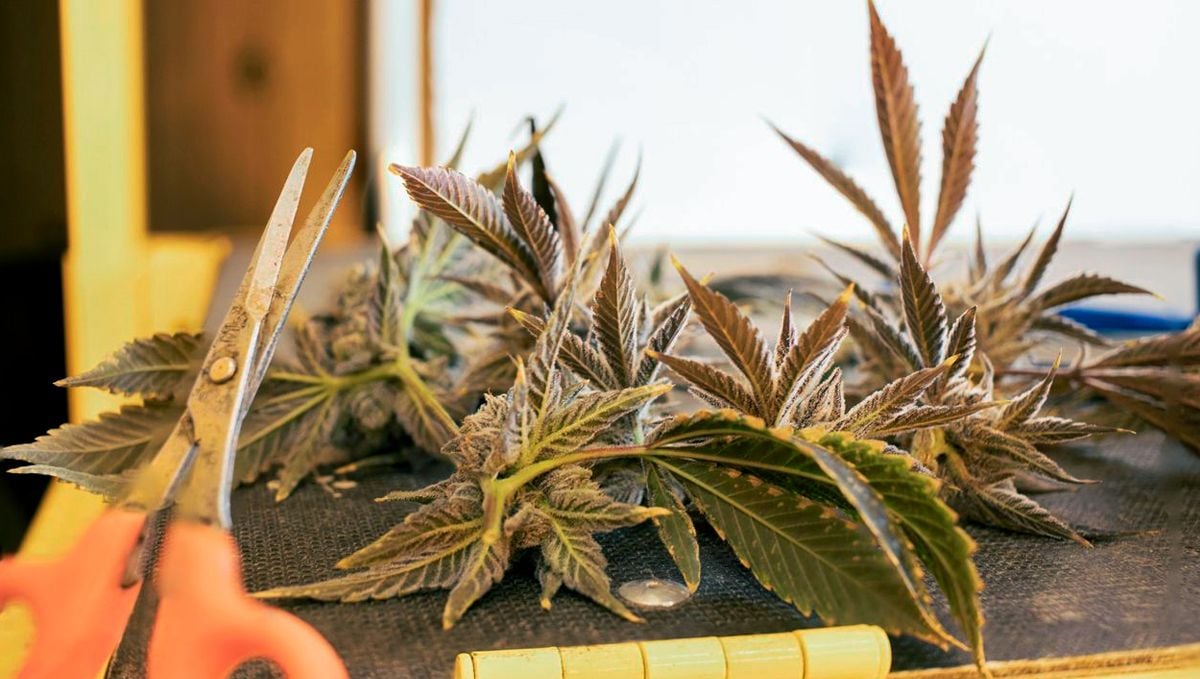
Depending on the genetics and type of training and pruning you performed on your plant, there can be quite a lot of plant material left. If you did a good job growing your plants, the excess you removed can be covered in resin.
There are two different ways of trimming: one consists of trimming before drying (wet cannabis trim) and the other consists of trimming after drying (dry cannabis trim). In either one of them, you will have plant leftovers (aka trims and fan leaves) that may be covered in trichomes still.
Not always the leftovers will have trichomes. Sometimes the plant doesn’t produce trichomes on areas surrounding the buds. If you’re planning on benefiting from it, we recommend growing strains that produce an extra amount of trichomes, like our new Gorilla Cookies Auto.
2. Disposing Of The Trimmings Responsibly
After finishing your grow cycle you may want to use the trimmings and leftover cannabis fan leaves to avoid wasting precious trichomes but it’s unlikely you’ll use everything because some plants just don’t produce much trichomes and sometimes it’s not worth the effort or maybe you’re just not interested in making edibles or extracts.
It doesn’t matter if you make something out of the trimmings or not, you need to be aware of how you discard the leftover plant material because, first of all, you may get in trouble if someone finds cannabis leftovers in your trash, and in second place, because cannabis trimmings can potentially be psychoactive and you don’t want to endanger animals or kids that may find the trimmings and cannabis fan leaves.
This is why you need to be mindful of how you discard your trimmings. There are several ways to dispose of cannabis leftovers; You can compost them, or double-bag the trimmings to make it harder for someone to find them but, you can also make the most out of them by making edibles and extractions.
3. Choosing What To Make
The quantity of plant leftovers you will have depends mostly on the number of plants you’re harvesting at the same time. The training and style of pruning will also influence that amount, but obviously, harvesting 5 plants at the same time will result in more trim than 1 or 2 plants. There are several things to do with the leftovers, the most common are dry sift hash, water hash, cannabutter, infused olive oil, and vaping the leftovers.
What You Can Make With trimmings
| Preparation Time | Amount Of Trimmings | Yields | Products |
|---|---|---|---|
| 30 min | 10 g | 1 g | Water Hash |
| 20 min | 10 g | 1.5 - 2.0 g | Dry Sift |
| 2 - 3 hs | 10 g | 0.3 g THC per 1 g | Cannabutter (500 g) |
| 2 - 3 hs | 10 g | 0.3 g THC per 1 g | Infused Olive Oil (500 g) |
4. Making The Most Out Of Trim
Have in mind that for all these things except for the water hash, you will need to dry the trim if you have wet trimmed your buds. Water hash can be made with fresh or dried trim, as long as you prevent plant material in the final product. Dry sifting the cannabis trim while still fresh may leave the hash green and with a plant flavor and smell, but it will not have an influence on the effect.
Making cannabutter, oil, or simply vaping the wet trim will leave a strong plant flavor and it’s recommended to dry before making anything with it. Due to not being dense like buds, it shouldn’t take that much to dry properly. Have in mind that for every plant you harvest you will have between 10-30g of trim and you will need quite a lot of cannabis trim for some of the following ways to make the most out of trim. The amount and quality of trim depend on a lot of things, mainly on the quality of the genetics and on how you train and prune your plants.
5. Water Hash
Water hash is recommended if you have a lot of plant material to work with, usually water hash has a 5-10% return rate, depending on the quality of the trim. That means that for every 200g of cannabis trim you will get around 10-20g.
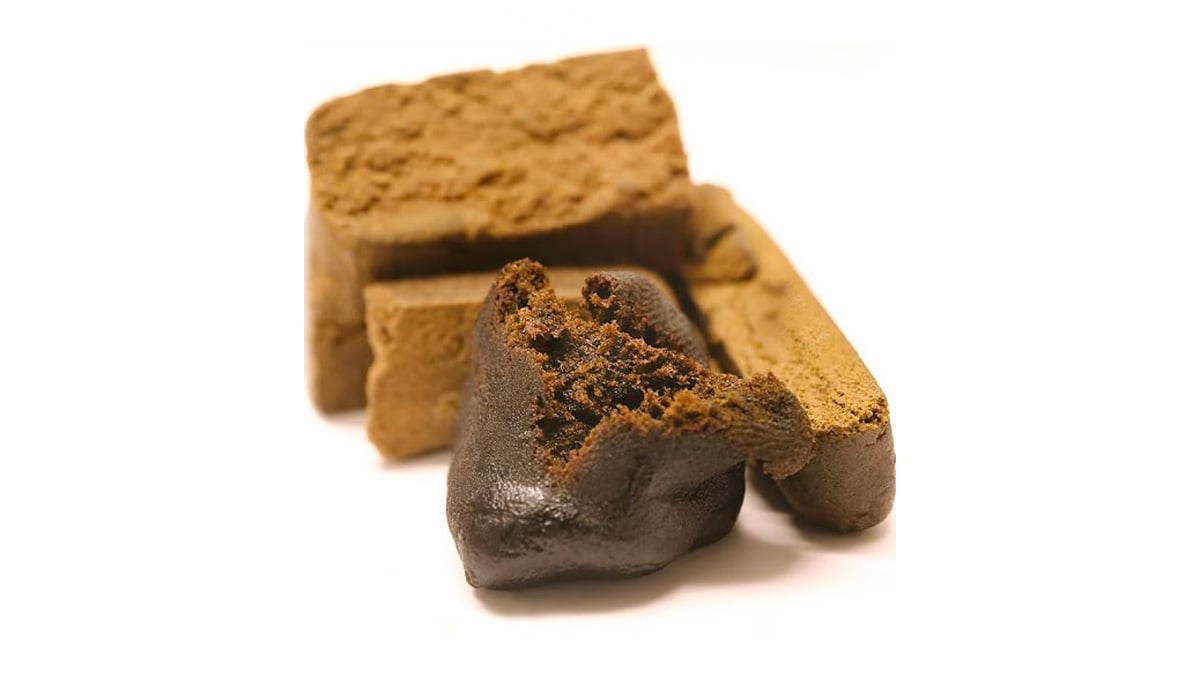
This technique is usually recommended for more experienced users because you have to be aware of a lot of things for it to be done properly.
Materials
- Ice
- Frozen cannabis trim
- Dried cannabis trim
- Bubble hash bags
- Buckets
- Big metal spoon
- Water hose
Have in mind that you can use a water hash machine to automate the process.
How To Make
For this method, you will have to place the bubble bags on the bucket, the bubble bags are the filters that will separate the residues from the trichomes. First, mix the water, ice, and frozen trims or cannabis fan leaves and let the trims hydrate for a couple of minutes (if dry). If the trims are not dry, you need to mix the water, trims, and ice gently so the trichomes fall down from the trims and mix in with the water. After 2 -3 minutes of gently mixing, lift up the bubble bags and use the water hose to wet the sides of the bubble bags to make the trichomes stuck to the sides go down to the bottom of the bubble bags.
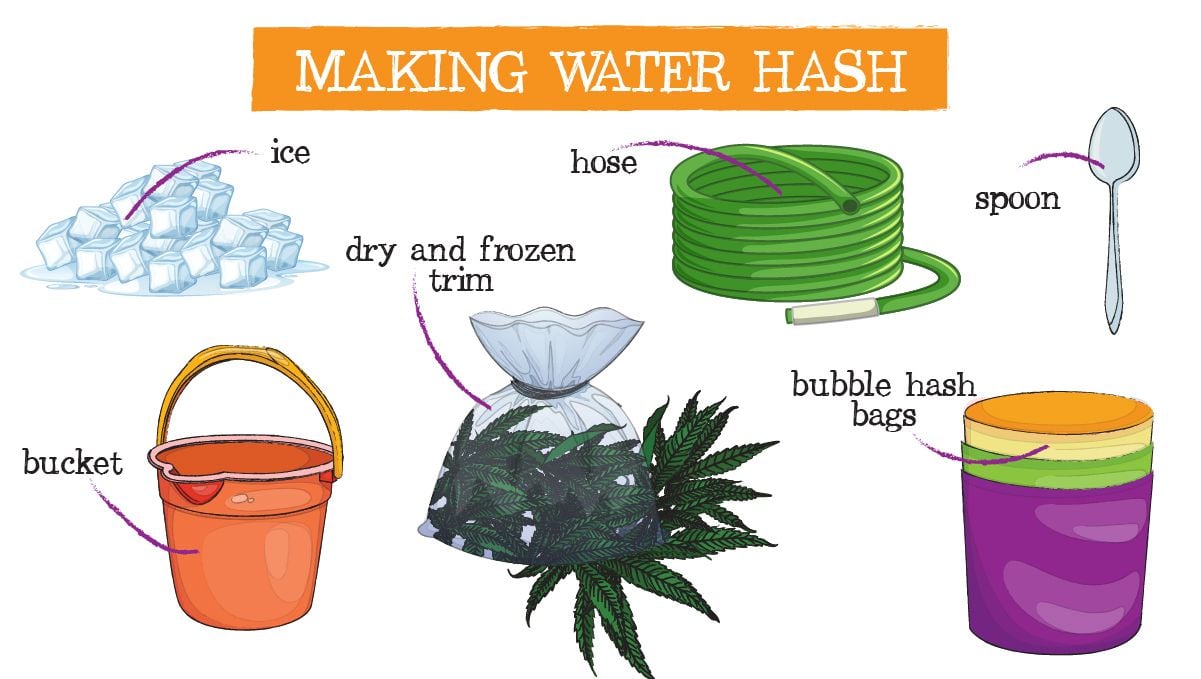
At this point, you should be able to see a bit of trichome together on the bottom. Repeat this process until you see the trims and fan leaves starting to disintegrate. When you see the cannabis trim starting to disintegrate, use the hose to wash the sides of the bubble bags and remove the hash with a metal spoon. Place it flat on a piece of cardboard, away from heat or strong sunlight, and let it dry. After a couple of days, it should be ready to be consumed.
6. Dry Sift Hash
For dry sift hash you don’t need as much trim as for water hash because it has a higher return rate of about 15-20%, as said before, it depends on the quality of the trim.
This means that for every 200g of trim you will get around 30-40g. This technique is one of the easiest and simplest, and you will only need a couple of things.
Materials
- Bubble bags or specific micron filter mesh
- Trims
- Card to collect kief
- Clean and big surface
How To Make
There are a couple of ways yo make dry sift hash, one of the most common ways is to freeze the trim, place it in the bubble bags and shake it. By shaking it, all the trichomes will fall through the filter mesh and fall on the surface under, that’s why you need a big and clean surface. After shaking for around 5 min, you can collect the hash with a card (like a credit card) and shake again.
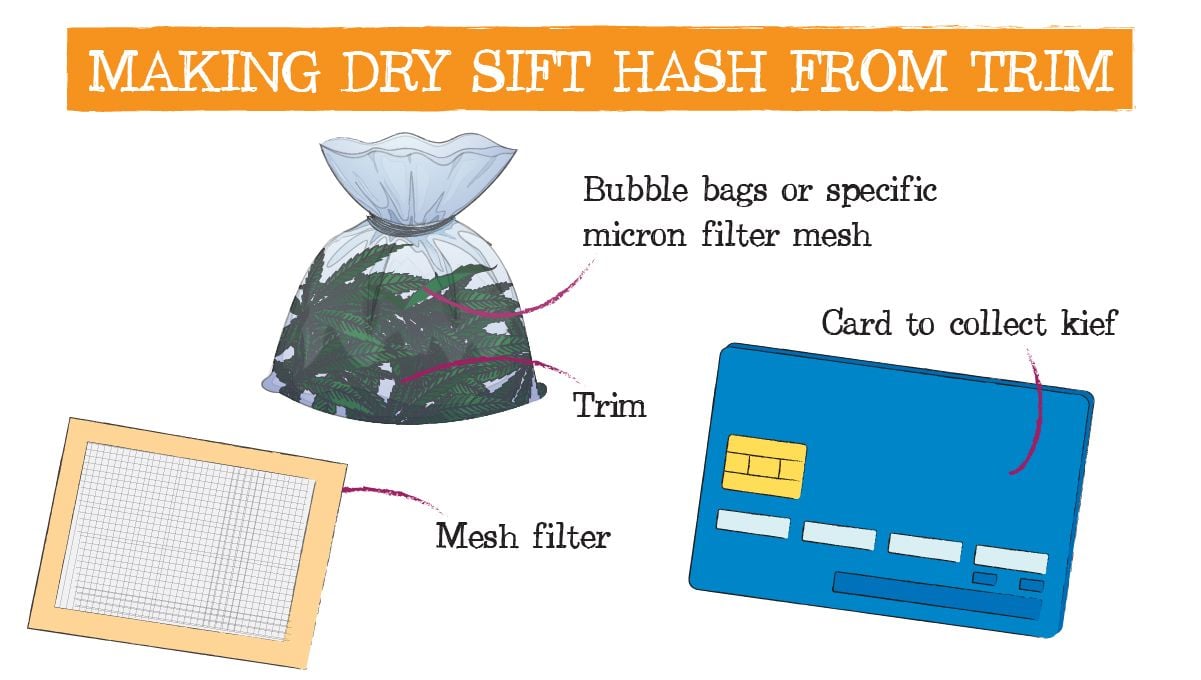
The more you shake the more hash you will have, but be aware that the quality will be lower on each cycle after the first. You can do this after you see small pieces of plant matter starting to fall through. There is also special equipment available that has the mesh on top of a bucket, so you don’t have such a hard time collecting the kief. This is one of the easiest methods to make full-spectrum extractions.
7. Decarboxylation
Now, when making dry sift and water hash there’s no need to decarboxylate the trimmings because they will get carboxylated (aka transform THCA into THC) when exposed to fire (smoked) but for the edibles to actually get you high you’ll need to activate the THC, this means that you need to heat the plant material, so here are 3 ways to do it:
Decarbing By Sous Vide
The nature of sous vide makes this method super easy but it’s definitely more expensive than the other ones because you will need an immersion circulator which can cost up to $100. Despite the high price, the immersion circulator lets you dial in the exact temperature you need, which preserves the flavor and cannabinoids while producing almost zero smell.
In order to decarb your cannabis this way you’ll need:
- Immersion circulator;
- A large container;
- Plastic resealable bag;
- And a vacuum sealer.
Decarbing In An Oven
Decarboxylating cannabis in an oven is probably the easiest method of all because you don’t need to buy anything. The downside is that the temperature dial shows an approximate temperature, not an exact one, so you need to be careful to avoid burning your plant material.
Set the temperature at around 90 - 100 °C but keep an eye on, if it turns brown too quickly or if it smells like its burning, turn the oven down. You can also use an oven thermometer to help you with the process, but it’s definitely not obligatory. In order to decarb your cannabis in the oven, you’ll need:
- A baking tray;
- Aluminum foil or parchment paper;
- And an oven.
Decarbing In A Glass Jar
Decarbing in a glass jar or mason jar is basically the same as in the oven but it has a couple of benefits over decarboxylating on the baking sheet. Doing it in a jar minimizes the smell and it can be harder to burn your plant material, so you don’t have to worry about burning your trimming as much. To decarb your cannabis this way you’ll need:
- A glass jar with a lid, preferably a mason jar;
- Baking tray;
- Kitchen towel;
- And oven gloves.
8. Cannabutter
Cannabutter is usually used in edibles like brownies, cakes, and cookies. You don’t need nearly as much trim as when making hash.
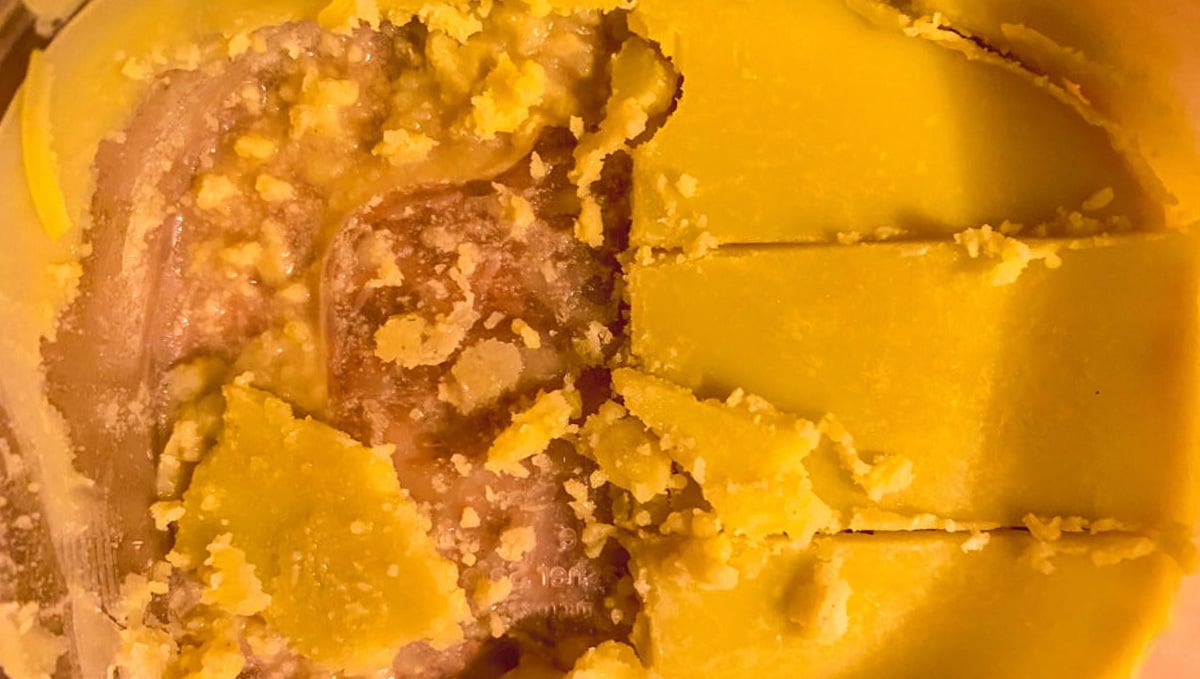
You can make cannabutter with as much trim as you want, the amount you use will influence the potency of the edible. Usually, a potent edible will have around 20 or 30g of trim, depending on the quality.
Materials
- Butter
- Cannabis trim
- Stove
- Pot
How To Make
Preheat your oven to 100°C, place the trim on an oven-safe tray, cover with parchment paper or tin foil and leave in the oven for around 20 - 30min. Every 10 minutes gently mix the buds gently so that they don’t burn and everything to decarboxylates equally. After everything has cooled down, place the decarboxylated trims in a glass jar along with the butter and put it in a water bath until the butter melts.
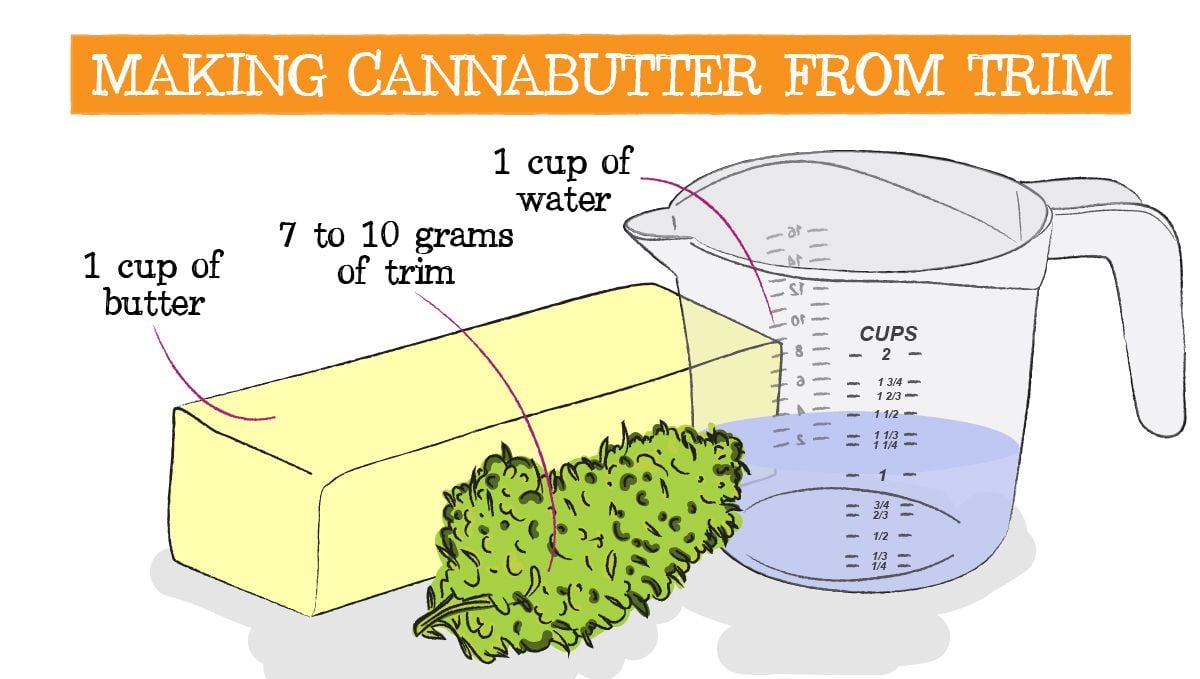
Be careful to not let the mixture exceed 95°C and it NEVER should come to a boil. Remember, adding more water to the water bath helps keep a lower temperature. After 2-3 hrs in the water bath at 95°C, strain the cannabutter and refrigerate until the butter solidifies and the excess water forms at the bottom of the jar. At this point, it is ready to use.
The best way to use cannabutter is to incorporate it as a topping or filling after you have baked the cake, cookies, brownies, or whatever you make. If you bake the cannabutter, it may lose its potency.
You can also make infused milk, it works the same way but instead of using butter you use whole milk.
9. Infused Olive Oil
Infused olive oil is a great way to consume cannabis without having to smoke it. Just like cannabutter, it should be consumed cold, in a salad, or in a way you don’t apply too much heat to it.
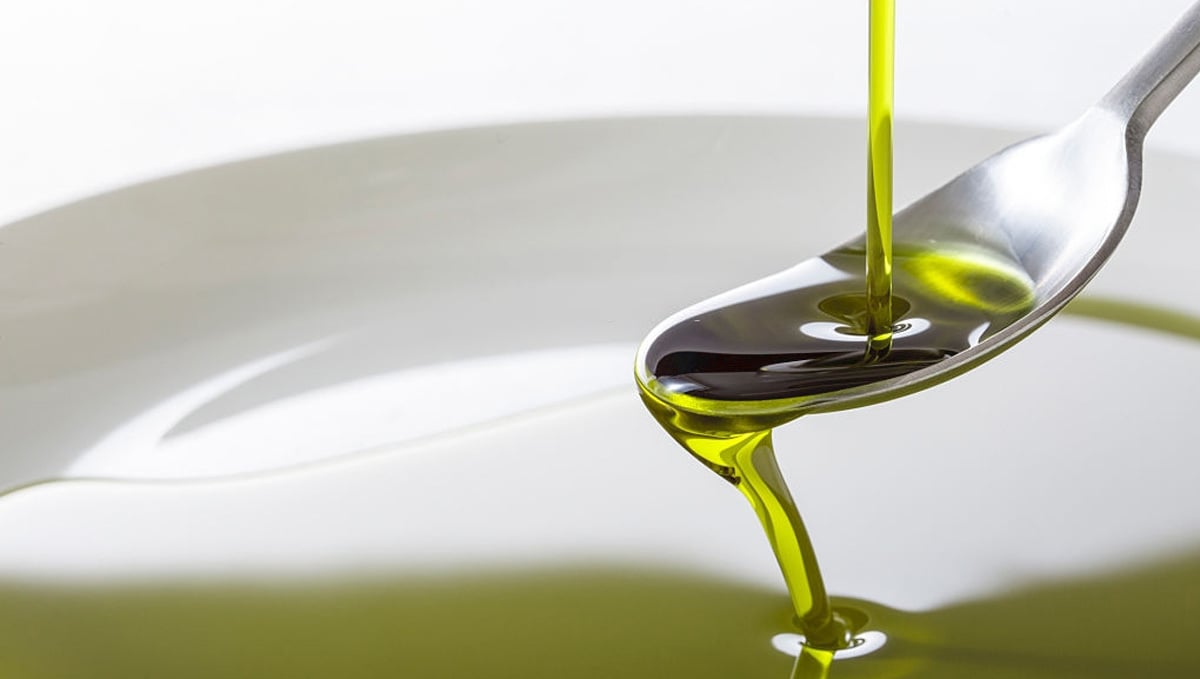
Also remember that this infused olive oil can be used on your skin and will have the same effect as when eating it, although it won't be as strong. Another great alternative is to make infused coconut oil which is better to apply on your skin and leaves a delicious smell!
Materials
- Olive Oil
- Cannabis trim
- Container
- Pot
How To Make
Infusing olive oil is kind of similar to making cannabutter but simpler. You will need a good quality olive oil, place it in a pot or saucepan on medium heat until it almost boils. When it is starting to bubble turn it off and add the trims, you can also add other herbs such as rosemary, thyme, or basil. The extra herbs will not only mask the strong cannabis flavor but will also make the oil taste better.
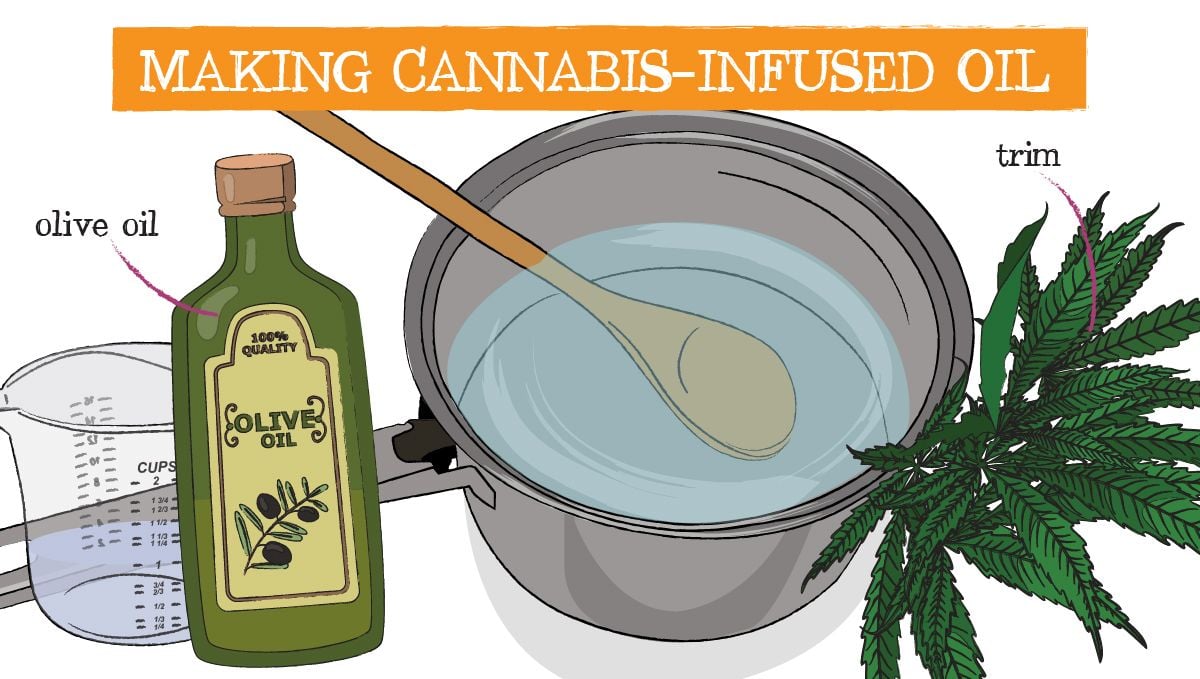
After around 2 or 3 hours of letting the herbs (including the cannabis trims) simmer in the olive oil, you can remove it from the stove, strain it and store it in a glass container. As long as you store it in a cool place it will be good for up to a year.
10. Other Ways To Use Trimmings
Due to cannabis trimmings containing the same cannabinoids as the flowers (although in much smaller concentrations), you can consume the trimmings in the same ways as you would consume flowers.
Vaporize Trimmings
Apart from making hash and edibles, you can vaporize the trimmings, pack a bowl or even roll a joint with it. Now, the trimmings won’t get you as high as smoking the flowers but it’s a good alternative if you’re looking to microdose or if you don’t want to get super high.
Cannabis Milk
With the weed trimmings, you can also infuse the milk and make your own cannabis milk at home. All you need to do is mix milk and ground-up weed, stir the mixture for 30-40 minutes on low heat until the milk turns into a yellowish-green color. Then strain the trimmings and store the cannabis-infused milk in the fridge for as long as the milk’s expiration date. This is a great way to make cannabis milkshakes, coffees, or smoothies!
Infusing store-bought Topicals
But, if you want to keep things simple and easy, all you have to do is follow the same process but infuse coconut oil instead of aromatic oils. Once you have infused the coconut oil, all you have to do is mix it with your favorite skin topical or cream and you’re set!
Make a Cannabis Tincture
You can infuse cannabis into practically anything as long as it contains alcohol or lipid to absorb the cannabinoids. This means you can also make cannabis tincture with the trimmings. All you have to do is get some high-proof alcohol and let your trimmings ask in it for a few weeks. Shake or mix the mixture once or twice a day to speed up the infusion process. If you’re looking to make a more potent tincture, let the alcohol and weed mix in an open-air container for the alcohol to evaporate and the cannabinoid content to become more concentrated. Or you can speed up the process by doing the same in a double boiler, but remember that alcohol is flammable so you should be extremely careful. This cannabis tincture can be added to any type of food or drink or absorbed orally for a fast-acting “edible”.
Topicals and Creams
Cannabis trimmings and fan leaves are also a great way to make skin topicals and creams. All you have to do is decarboxylate your weed, as explained above, then grind it into a fine powder and mix it with the essential oils of your choice such as lavender, rosemary, clove, or lemon. Then place everything in a glass bottle and let infuse for 3-4 days up to 1 week, mixing thoroughly every 12-24 hours.
Cannabis Juice
Another way to consume the benefits of cannabis is to make cannabis juice with the fan leaves and trimmings. Now, cannabis juice will not get you high at all but cannabis leaves contain lots of proteins as well as Omega-3 and Omega-6. This is a super healthy way to reduce waste, just remember that the leaves should be healthy! There’s no denying that sugar leaves possess more trichomes than fan leaves. There’s a good reason they’re the first choice when it comes to making hash and other products with trim. However, recent scientific findings have revealed that fan leaves are perhaps the most overlooked part of the cannabis plant. While you won’t want to roll them into a joint or pack them into a bong bowl, they can play a great role in a health regimen.
You can essentially view cannabis fan leaves as a leafy green vegetable that’s not far off from kale, spinach, chard, and other more popular options. Much like these common types of veg, fan leaves are packed with nutrients that make them a valuable addition to salads, smoothies, and juices. But what exactly makes cannabis leaves so special?
These large natural solar panels don’t contain many cannabinoids and terpenes, the two most popular groups of phytochemicals found in cannabis. However, they are high in flavonoids. This family of compounds is classed as polyphenols and, along with cannabinoids and terpenes, occur in cannabis as secondary metabolites.
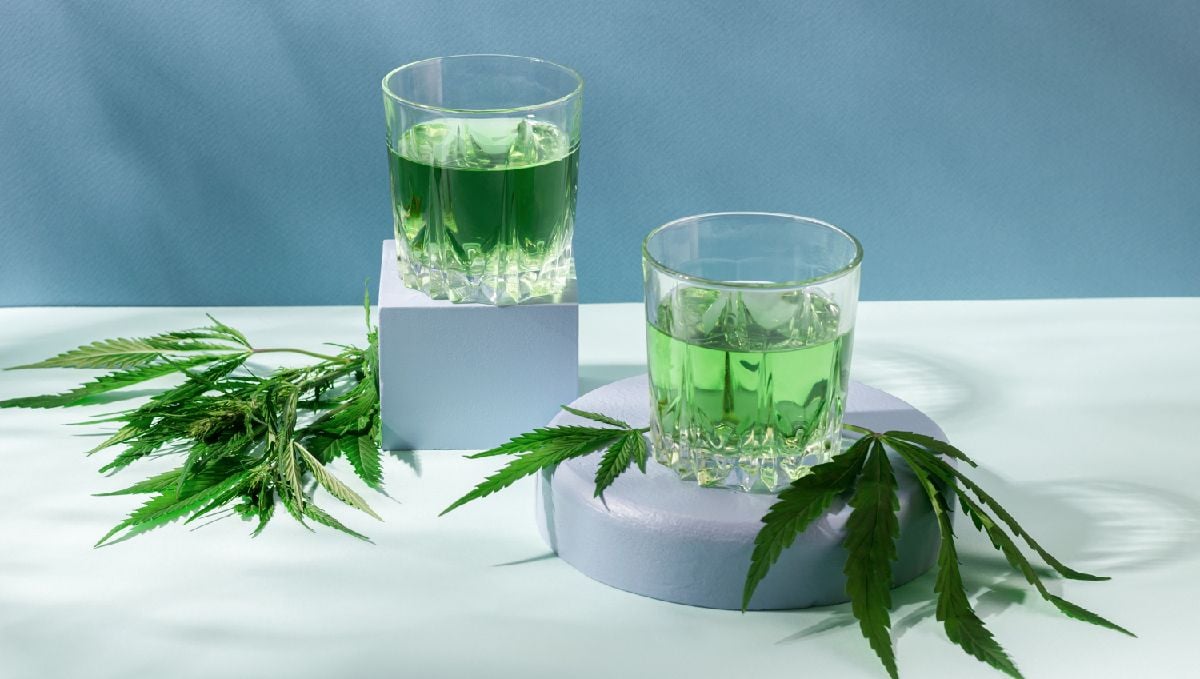
This means they aren’t directly involved in the growth and reproduction of plants. Instead, they play an important role in defense against different kinds of stress. As pigments, they help to reflect certain types of light and also serve as a form of communication between plants and microorganisms. Flavonoids are abundant in an array of popular plants and plant products, such as chocolate, wine, tea, fruits, and vegetables.
Cannabis fan leaves contain some flavonoids that are found in many other plant species. These compounds include apigenin, luteolin, kaempferol, and quercetin. These chemicals are well known for their anticancer and antioxidant properties. Interestingly, quercetin actually interfaces with the endocannabinoid system—the same physiological system that THC, CBD, and other cannabinoids interact with. As well as these ubiquitous flavonoids, cannabis fan leaves also house flavonoids that are largely unique to the cannabis plant known as cannaflavins. These fascinating molecules make cannabis fan leaves a particularly desirable plant to start juicing. Why? Because cannaflavins have been shown to possess powerful anti-inflammatory effects. In fact, one study found a member of this chemical group to produce 30 times the anti-inflammatory effect of the drug aspirin.
So, next time you defoliate your leaves part way through the growing cycle, or cut them off following harvest, why not put them to good use in the kitchen before throwing most of them onto the compost pile?
Use for Garden Compost
And finally. You can use the cannabis trimmings or fan leaves to make compost. Compost is also a great way to reduce waste while enriching the soil. Remember that you can compost trimmings and fan leave but you can also compost the stems, stalks, and everything else. This leftover plant material is a great way to add nitrogen to your compost pile which can be recycled and used on your next cannabis grow cycle. This compost can not only be used mixed in the substrate but can also be used to make compost teas that will help you correct minor deficiencies and provide the micronutrients your plants need.
11. In Conclusion
There’s no need to throw away any part of the plant when in the process of marijuana trimming, especially if you know how to trim marijuana, have in mind that even the roots and branches can be useful if you know how to use them.
Remember the amount of trichomes in the cannabis trim will vary according to how you grow your plants, the type of nutrients, environment, training, pruning will have a direct influence on the quality and quantity of your trim, and this may dictate if it’s worth to actually make something with the trimmings and fan leaves or not, and what to make. Apart from these elements, genetics are the main factor that influences trichome production, so make sure you start with THC-rich strains such as our Strawberry Banana auto.
As mentioned, making cannabis products with weed trimmings and cannabis fan leaves is not obligatory, you can always dispose of the weed trim and fan leaves but you’ve spent time and money growing your plants so you might as well make the most out of every single thing you have available.
If you have more tips on how to make the most out of trimmings and cannabis fan leaves such as homemade edible recipes or other cannabis-infused products, feel free to help fellow growers by leaving a comment in the comment section below!







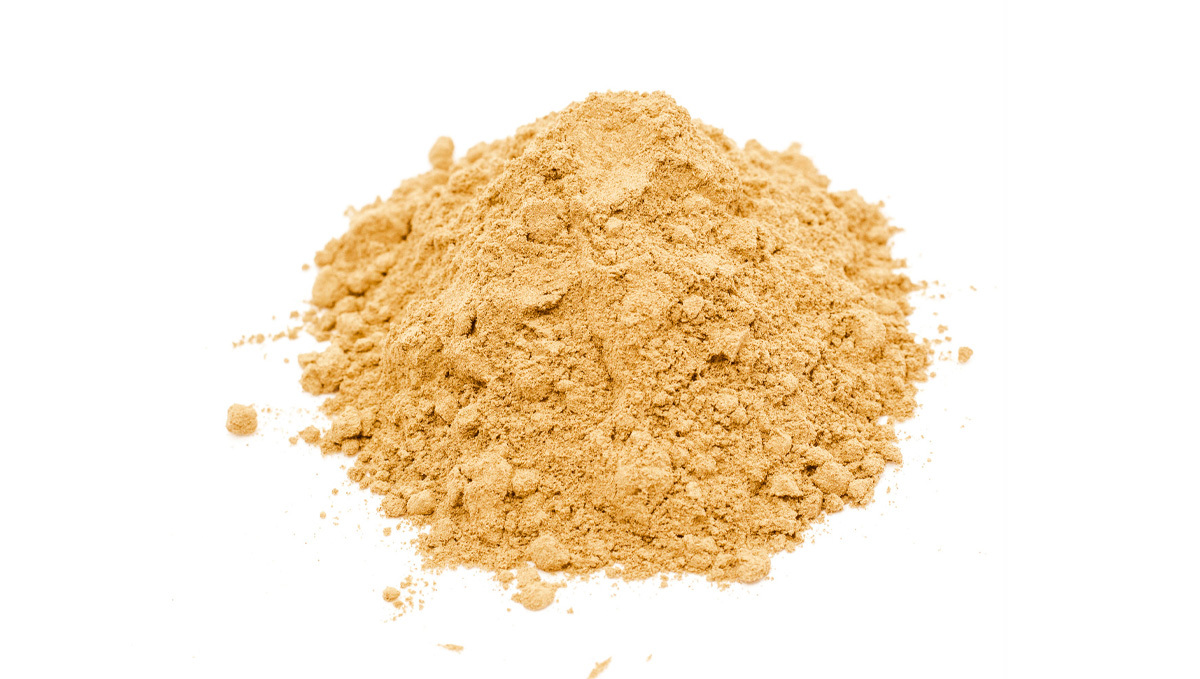
Comments